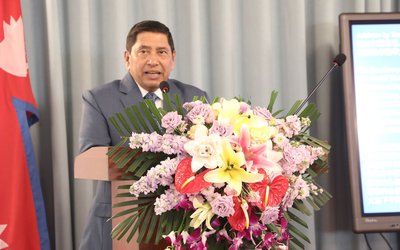Despite living under severe human rights violation, the cause of women of Madheshi community rarely received global attention. However, Shyam Kumari Sah received a “Human Rights Defender Award” from the French government. It was handed out on Mission to Nepal of Francois Zimeray, Ambassador for Human Rights.
At the request of Alain Juppé, Minister of State, Minister of Foreign and European Affairs, Ambassador for Human Rights, Zimeray handed over the award.
At the award distribution ceremony, Zimeray insisted on the government’s obligation to protect the human rights of its citizens and to implement an effective judiciary system.
“I dedicate this prize to all the rural women and to my illiterate parents who sent me to school,” said Sah. She felt really proud that her work was being recognized publicly.
Sah is a human rights defender, treating all human-related issues and especially violence against women and witch-hunting. She collaborates with WOREC (Women Rehabilitation Center) and is the founder of the ONG Mukti Nepal. She mainly works in the Terai Region, adjacent to Indian borders, where most women are subjected to domestic violence or at times persecuted as witches.
Witch-hunting is still a reality and innocent women are held responsible for natural life events such as illnesses or death. “It is a useful system if you want to blame someone else for your own problems or acquire their property. Their punishment varies from being beaten –which is often lethal-, being forced to eat excreta or being paraded naked. Some women commit suicide in order to avoid this public humiliation and torture. But you don’t “need” to be a witch to experience domestic violence. In fact, gender inequality is higher in these regions than in the capital and women get beaten mostly because of dowry or polygamy,” said Sah.
Most of the victims perceive the way they are treated as their fate and do not even consider talking about it because of the prevailing culture of silence. Besides, women fear that talking could lead to being tortured again. They often lack education and resources. This makes them dependent on their family to survive. But the problem also originates from the judiciary system.
According to Sah, no specific law exists for witch hunting and marital rape is considered a husband’s right. Furthermore, the worst punishment–if the case is not miraculously stopped before it happens- would be a heavy fine or short-term imprisonment. Such charges are not sufficient to prevent the continuing of this gender-based violence. So, how can greater respect for human rights be promoted without damaging the social and cultural coherence of local communities? In this patriarchal system, women are often treated as simple possessions. Villagers too often tend to rely blindly on spiritual healers. The latter make women responsible for facts completely beyond their control. How could the empowerment of women have a positive influence in the townships rather than a negative one? What could be the role of education in this process?
In Western countries, hundreds of thousands of people were killed because of witch hunts. But this came to an end with the end of the religious wars and the centralization of power and stability that followed, the modernization of cities and therefore the increase in school of thoughts that condemned this phenomenon of violence and the implementation of new legislations forbidding witch hunts. Moreover Education and sensibilization helped reduce the arbitrariness of accusations against women and the resulting violence.
Addressing the program, French Ambassador to Nepal said it is a great privilege for them to recognize right activist Sah who really has shown courage to work in interior villages.
The award given to Shyam Kumari Sah is a way to raise people’s awareness and sensitivity to the problem. It empowers the victims of any type of violence with the legitimacy to assert their rights. Furthermore, it acts as an encouragement for other right activities and promotes the protection of human rights. By sensitising people and protest united, we can end this type of violence. So what are you waiting for?
JEANNE MARTIN is an intern from Belgium.
- FOREIGN EXCHANGE: Largest Deposit
- Jul 22, 2024
- IMF: Approval Of SDR
- Jul 22, 2024
- NEPAL-KOREA RELATIONS: Fifty-Years Of Warm Relations
- May 31, 2024
- NEPAL-BRITAIN: Centenary Celebration
- May 31, 2024
- POLITCS: Forming New Alliances
- May 27, 2024
















